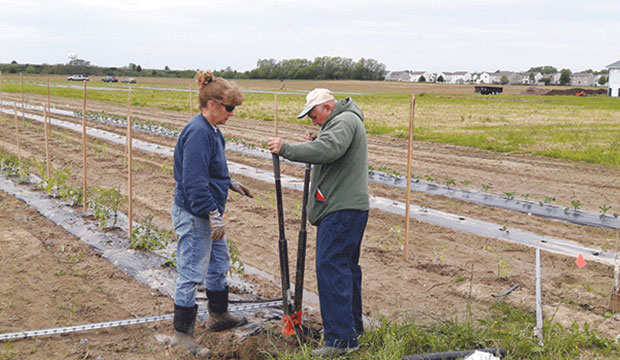DOVER, Del. — Delaware State University’s Extension generally does what John Clendaniel refers to as “shotgun training.”
If several farmers want to try tomato farming, an Extension agent can teach them about disease or high tunnels.
They can design workshops and invite the wider farming community to learn more about, say, risk management.
But several years ago, university Extension personnel began to realize that some farmers — often those with minimal experience — learned from workshop instruction on a single crop or issue, but not enough to avoid mistakes elsewhere in their operations.
“We kind of felt that the follow-through, the impact of sorts, was weak,” said Clendaniel, the university’s Small Farms Program coordinator at the College of Agriculture and Related Sciences. “You know that whole, ‘A little bit of information is dangerous’? … [Some farmers] didn’t know something, and it was costing producers money.”
In response, Clendaniel and the university launched the Farm School Program two years ago with a $250,000 grant from a USDA program for socially disadvantaged and veteran farmers.
It’s a yearlong school for anyone in Delaware interested in intensive agricultural instruction, Clendaniel said.
The school, which is similar to a university certificate program, meets with students about twice a month from November to October and is taught by Delaware State Extension personnel.
The classes explore everything from risk management and production to equipment operation and marketing across a field of agricultural endeavor that includes such fields as aquaculture, beef cattle, small flock poultry, small ruminants and vegetable production.
It focuses primarily on small farm operations, a niche the college has carved out while the University of Delaware in Newark handles much of the state’s large-scale farming instruction. It’s also free.
“The kids in our school, they’re not the next-generation farmer,” Clendaniel said. “They are people who live in housing developments or they own a piece of land, and they want to farm.”
Students at the school are able to pick from areas of focus, and after a period of classroom instruction, they begin farming on university plots, assisted by Extension personnel.
Both school classes have had about 15 students, Clendaniel said, and some of them have gone on to begin farming on their own.
Zachary Dittmar, 33, of Felton, Del., went through the farm school with his wife Jenny in 2016.
Though he was raised in agriculture in Wisconsin, he holds two jobs and wanted to jump back into farming with a small vegetable operation.
Jenny had no farming experience.
“My wife was a city slicker,” he said.
After they completed the school, they began a vegetable plot in their backyard and eventually got permission to cultivate portions of their neighbors’ yards.
They purchased 40 acres last year and began a small CSA.
The farm school prepared the couple, Dittmar said.
“If you were a person who didn’t know anything about gardening or chickens, you would walk away with a good understanding,” he said. “It takes you from start to finish.”
The university was denied when it reapplied for the USDA grant this year, Clendaniel said, and it’s waiting to learn why.
No matter what, the university intends to hold another farm school next month, though it might be smaller in scope.
Without a grant, the school may be unable to rent plots of instructional farmland in different parts of the state, including one for local Native American tribes, he said.
“I can still give that Farming 101, that business piece and all the things that that goes into. I can present those even without the funding,” Clendaniel said.
It’s a good way to create more Zachary Dittmars in Delaware.
“The farm school was really to take beginning person and go through the stem to stern with farming,” he said.
“We’re going to give you some hands-on experience. We’re going to showcase some stuff.
“We’re going to give you a lot of classroom stuff.
“We’re going to make you think about it business-wise.”
The Delmarva Farmer, Jonathan Cribbs, October 12. 2018

